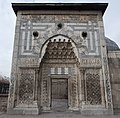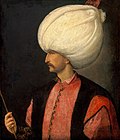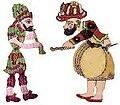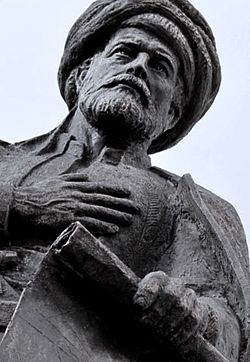Portal:Turkey
Merhaba! Türkiye portalına hoş geldiniz. Hi! Welcome to the Turkey portal.
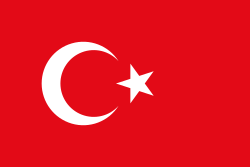 | |
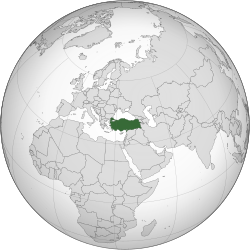
| |
Turkey, officially the Republic of Türkiye, is a country mainly located in Anatolia in West Asia, with a relatively small part called East Thrace in Southeast Europe. It borders the Black Sea to the north; Georgia, Armenia, Azerbaijan, and Iran to the east; Iraq, Syria, and the Mediterranean Sea to the south; and the Aegean Sea, Greece, and Bulgaria to the west. Turkey is home to over 85 million people; most are ethnic Turks, while Kurds are the largest ethnic minority. Officially a secular state, Turkey has a Muslim-majority population. Ankara is Turkey's capital and second-largest city. Istanbul is its largest city and economic center. Other major cities include İzmir, Bursa, and Antalya.
First inhabited by modern humans during the Late Paleolithic, present-day Turkey was home to various ancient peoples. The Hattians were assimilated by the Hittites and other Anatolian peoples. Classical Anatolia transitioned into cultural Hellenization after Alexander the Great's conquests, and later Romanization during the Roman and Byzantine eras. The Seljuk Turks began migrating into Anatolia in the 11th century, starting the Turkification process. The Seljuk Sultanate of Rum ruled Anatolia until the Mongol invasion in 1243, when it disintegrated into Turkish principalities. Beginning in 1299, the Ottomans united the principalities and expanded. Mehmed II conquered Constantinople (modern-day Istanbul) in 1453. During the reigns of Selim I and Suleiman the Magnificent, the Ottoman Empire became a global power. From 1789 onwards, the empire saw major changes, reforms, centralization, and rising nationalism while its territory declined.
In the 19th and early 20th centuries, persecution of Muslims during the Ottoman contraction and in the Russian Empire resulted in large-scale loss of life and mass migration into modern-day Turkey from the Balkans, Caucasus, and Crimea. Under the control of the Three Pashas, the Ottoman Empire entered World War I in 1914, during which the Ottoman government committed genocides against its Armenian, Greek, and Assyrian subjects. Following Ottoman defeat, the Turkish War of Independence resulted in the abolition of the sultanate and the signing of the Treaty of Lausanne. Turkey emerged as a more homogenous nation state. The Republic was proclaimed on 29 October 1923, modelled on the reforms initiated by its founder and first president, Mustafa Kemal Atatürk. Turkey remained neutral during most of World War II, but was involved in the Korean War. Several military interventions interfered with the transition to a multi-party system.
Turkey is an upper-middle-income and emerging country; its economy is the world's 16th-largest by nominal and 11th-largest by PPP-adjusted GDP. As the 15th-largest electricity producer in the world, Turkey aims to become a hub for regional energy transportation. It is a unitary presidential republic. Turkey is a founding member of the OECD, G20, and Organization of Turkic States. With a geopolitically significant location, Turkey is a NATO member and has its second-largest military force. It may be recognized as an emerging, a middle, and a regional power. As an EU candidate, Turkey is part of the EU Customs Union.
Turkey has coastal plains, a high central plateau, and various mountain ranges with rising elevation eastwards. Turkey's climate is diverse, ranging from Mediterranean and other temperate climates to semi-arid and continental types. Home to three biodiversity hotspots, Turkey is prone to frequent earthquakes and is highly vulnerable to climate change. Turkey has a universal healthcare system, growing access to education, and increasing levels of innovativeness. It is a leading TV content exporter. With numerous UNESCO World Heritage sites and intangible cultural heritage inscriptions, and a rich and diverse cuisine, Turkey is the fourth most visited country in the world. (Full article...)
Selected article -
Mount Erciyes (Turkish: Erciyes Dağı) is an inactive volcano in Kayseri Province, Turkey. It is a large stratovolcano surrounded by many monogenetic vents and lava domes, and one maar. The bulk of the volcano is formed by lava flows of andesitic and dacitic composition. At some time in the past, part of the summit collapsed towards the east.
The volcano began to form in the Miocene. At first, a volcano farther east named Koç Dağ formed from lava flows. Then, again to the east, large explosive eruptions formed a caldera. During the Pleistocene, Mount Erciyes proper grew inside the caldera together with a group of lava domes. Lateral eruptions of Erciyes may have generated ash layers in the Black Sea and the Mediterranean during the early Holocene. (Full article...)
General images
Did you know -
- ... that the Galatasaray S.K. has origins from the Ottoman Empire era? (December 4, 2007) Wikipedia:Recent additions 190
- ... that Yavuz Yapıcıoğlu, nicknamed the "Screwdriver Killer", is the serial killer with the highest known victim count in Turkey? (March 22, 2014)
- ... that Turkish female aviator Nezihe Viranyalı was educated in civil aviation at the University of Tennessee following an invitation by the renowned American pilot Jacqueline Cochran? (January 2, 2009) Wikipedia:Recent additions 238
- ... that during the Ottoman–Venetian War of 1570–1573, the 8,500-strong Venetian garrison of Famagusta in Cyprus held out for eleven months against an Ottoman army of 200,000 men? (December 13, 2008) Wikipedia:Recent additions 236
- ... that the 2011-opened Ahmet Hamdi Tanpınar Literature Museum Library in Istanbul is housed in a building, which once served for Ottoman sultans to accept salutes during a military parade? (February 26, 2014)
- ... that the remains of the Bogdan Saray in Istanbul lie inside a tire shop? (April 13, 2012)
- ... that when Turkey gave out personal identification numbers to their citizens in 2000, they chose to number all 120 million people born since 1840, living or dead? (November 11, 2009) Wikipedia:Recent additions 250
Selected picture
Selected biography -
Piri Reis (Turkish: Pîrî Reis; born Muhiddin Piri; c. 1470–1553) was an Ottoman Turkish cartographer, admiral, navigator, and corsair. He is best known for his 1513 world map and his nautical atlas, the Kitab-ı Bahriye (Book of the Sea). His maps combined classical sources, his own seafaring knowledge, and information from new European discoveries. The 1513 world map drew international attention when rediscovered centuries later during renovations to the Topkapı Palace in Istanbul because it includes details from a now-lost map by Christopher Columbus.
He began his maritime career sailing with his uncle, the corsair Kemal Reis, with whom he entered Ottoman naval service. He later commanded his own ship in the Ottoman–Venetian wars and, following his uncle’s death, began the cartographic work for which he became best known. Returning to the fleet by 1516, he took part in the Ottoman conquest of Egypt. He presented his world maps and atlases as gifts to the Ottoman Sultan, and commanded a small group of ships in naval operations in the eastern Mediterranean. Later, as grand admiral of the Ottoman fleet in the Indian Ocean, Piri Reis led successful campaigns in the Red Sea, but was executed following his retreat from the siege of Hormuz Island at the mouth of the Persian Gulf. (Full article...)
Selected video -
Selected quote -
| “ | Today the Soviet Union is a friend and an ally. We need this friendship. However, no one can know what will happen tomorrow. Just like the Ottoman and Austro-Hungarian Empires it may tear itself apart or shrink in size. The people that it holds so tightly in its grip may one day slip away. The world may see a new balance of power. It is then that Turkey must know what to do. Ally Soviets have under their control our brothers with whom we share language, beliefs and roots. We must be prepared to embrace them. Being ready does not mean that we will sit quietly and wait. We must get ready. How does a people get prepared for such an endeavour? By strengthening the natural bridges that exist between us. Language is a bridge... Religion is a bridge... History is a bridge... We must delve into our roots and reconstruct what history has divided. We can't wait for them to approach us. We must reach out to them. | ” |
Recognized content
Provinces
Related portals
Religions in Turkey
Neighbouring countries
Countries with related heritage
WikiProjects
Turkish wikipedia
 |
There is a Turkish version of Wikipedia, the free encyclopedia. |
Wikimedia
The following Wikimedia Foundation sister projects provide more on this subject:
-
Commons
Free media repository -
Wikibooks
Free textbooks and manuals -
Wikidata
Free knowledge base -
Wikinews
Free-content news -
Wikiquote
Collection of quotations -
Wikisource
Free-content library -
Wikiversity
Free learning tools -
Wikivoyage
Free travel guide -
Wiktionary
Dictionary and thesaurus























